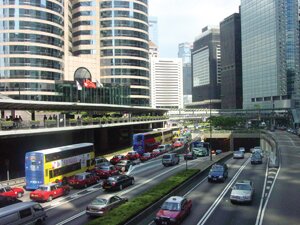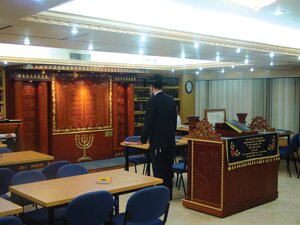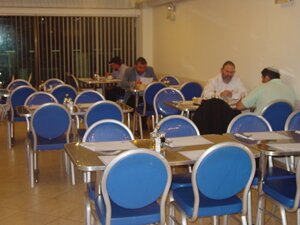|
In every field of endeavour, there are entities that are well known and those who operate “under the radar.†Some people, companies, or communities, prefer to shun publicity, instead focusing their energies on getting on with their endeavours.
Â

Connaught Road, Central
|
Such a description could be applied very effectively to Shuva Israel, the “other†Jewish community on Hong Kong Island.
But while Shuva doesn't draw a lot of attention to itself, that doesn't mean its impact is unfelt, or even insignificant.
If someone needs a kosher meal, either in a restaurant or in his office, in Central, Shalom Grill can provide it. If a visitor needs a minyan in Central, Shuva is there three times a day. If anyone wants an evening shiur or one-on-one learning, this is another area that Shuva addresses.
Shuva Israel developed from a group of religious Israelis who were part of Ohel Leah Synagogue until the early 1990’s. The driving force behind the group was the Darwish family.
Today, Shuva occupies a distinct niche in the Jewish life of Hong Kong. It serves Hebrew-speaking visitors, residents, and backpackers quietly and with commitment.
Shuva’s organisational structure is uniquely suited to what it sees as its mission of service.
There are five main areas: the synagogue, adult learning, kosher food, a kindergarten and talmud torah, and outreach to backpackers. Each of the areas is under the supervision of a young rabbi from Israel. The four rabbis together form a kollel that supports other adult learning activities.
 Â Â |
The synagogue and beit medrash, restaurant, and kosher grocery occupy two floors of Fortune House in Connaught Road Central.
Services using sefardi nusach are held three times daily, including Shabbat and the high holidays. The synagogue, in true Jewish tradition, turns into a beit medrash after services.
The focus during weekday evenings is on adult learning in pairs or small groups. On an average evening perhaps two or three dozen people meet to learn, making use of an extensive library of seforim.
One-on-one learning can also be arranged personally, to suit individuals’ needs and schedules.
The synagogue is located upstairs from Shalom Grill and the kosher grocery, the second area of Shuva. The location is crucial, so that visitors who are staying in Central need not make arrangements with two different organisations for Shabbat or holidays.
Meals nearby are more than a simple convenience for visitors; they are necessary for a visitor staying at a nearby hotel. Guests may also arrange for hot meals to be delivered from the Grill on Shabbat and chaggim.
Shalom Grill opened in 1993, and features a menu of Middle Eastern specialties. Lunch and dinner are served Sunday through Thursday. The restaurant is under the full-time supervision of two mashgichim from Israel.
The next-door grocery specialises in kosher products from Israel and the United States. The focus is on packaged products that travelers can take into China, but kosher meat and chicken are also available. Grocery orders can be delivered anywhere in Hong Kong.
The most unique activity undertaken by the Shuva community is also its newest. Shuva members became aware in the mid-1990’s of the vast numbers of non-religious Israeli young people spending months traveling around Asia.
Initially, outreach efforts were made in Bangkok, with a rabbi from Shuva traveling there with everything needed for a heimische Shabbat, plus materials for learning.
After doing this for a few years, it became clear that better work could be done with the young people in Hong Kong, for less expense, since the facilities in Hong Kong were already set up.
It also made more sense to bring the young people out of their guest houses, so that once they’d done some learning, it would be more likely to “stick.â€
 Â Â |
Posters were put up in the Bangkok guesthouses frequented by backpackers. A screening process was developed to identify young people who were sincerely interested in a learning experience.
And now, several times yearly – during the tourist high seasons in the fall and spring – four-day seminars are led for as many as forty young Israelis at a time. Both girls and boys participate.
The secret to such a programme’s success, of course, lies in the personality of the person in charge. In that regard, Shuva has been lucky. The current rabbi in charge is a gregarious, open and engaging young man who is clearly a “people†person.
“We try to give them a complete immersion experience in traditional Judaism. Some of them don’t really know anything. They grew up in Israel, and they feel a connection to Israel, but not to Judaism. If I do something as simple as make a b’racha, ‘she-ha-col nehiyeh bidvoroh,’ they’ve never heard such a thing. One fellow looked at me, when I made a she-ha-col, with total confusion, then his face broke into a big smile and he responded, ‘L’chayim!’
“We aren’t trying to make them into religious Jews overnight,†the rabbi continued. “What we want is to give them a taste of something that is perhaps new to them but really a part of them. They come to Asia to see all these new cultures, and their own Jewish heritage is a new culture to them too.â€
When asked if the recent unrest in Nepal had had any affect on the masses of Israelis who generally spend Passover there, the rabbi chuckled.
“The guerillas have their own system. They hold you until you pay them. It’s not a lot. It’s just a small sum, and when you pay them, they give you a receipt. They figure they’re in charge as much as the government. The government charges you a departure tax, and so do they. And once you’ve paid it, you keep the receipt and show it in case any other groups catch you.â€
Small is beautiful for Shuva in its outreach. The community has two apartments that it uses for the backpackers, which effectively limits the number of young people per seminar, but that limitation keeps things manageable. After all, a “homey†Shabbat includes family meals.
About ten families make up the Shuva Israel congregation. The community has a pre-school and a cheder in the Pokfulam district, with twelve children currently in the kindergarten and seventeen in the cheder, up to age twelve.
The main drawback Hong Kong presents to a community like Shuva is the lack of post-primary education. The de-facto community leader, who has been in Hong Kong for eighteen years, is planning to return to Israel this summer. His oldest daughter has reached bat mitzvah, and her educational needs have outgrown the Hong Kong community’s capacity to meet them.
This is a problem for all Hong Kong Jewish families, but for the Shuva community it is more acute. Their commitment to authentic Torah Judaism in Eretz Yisrael is of paramount importance.
It is a modern reflection of two thousand years of combining study with a livelihood, insisting on a balance that was defined by the great Rabbi Shimon Bar Yochai – only as much work as is necessary to sustain study, and faith in G-d for everything else.
For the families of Shuva Israel, a sojourn in Hong Kong is only temporary, and at the right time, having given back to the Hong Kong kehillah, they return (shuva) to Israel.
Â
Fact Box
SHUVA ISRAEL
3/F, Fortune House
61 Connaught Road
Central, Hong Kong
Tel:Â (852) 2851-6300
    (852) 2851-6218
Fax: (852) 2851-7482
email:
This e-mail address is being protected from spambots. You need JavaScript enabled to view it
www.shuva-israel.com
Â
(Issue June 2006)Â
|




